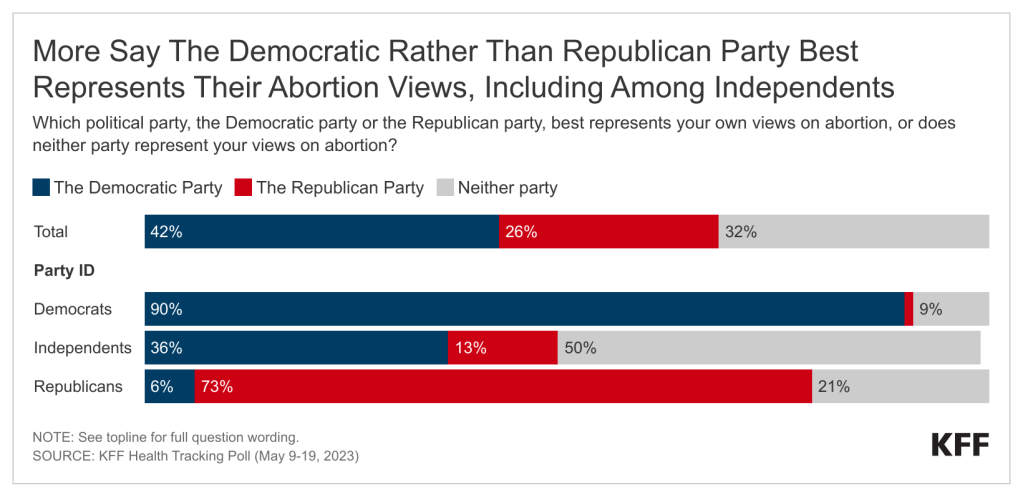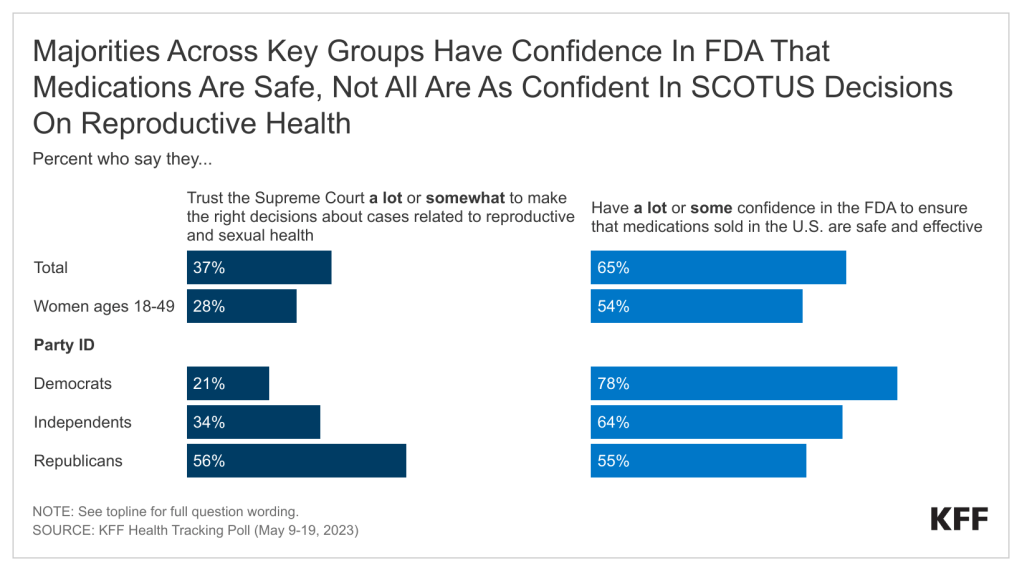
The independent source for health policy research, polling, and news.
New KFF Survey Finds Abortion Remains Key Issue for Voters with Democrats Holding a Sizeable Edge over Republicans; A Third of Women Say They’ll Only Vote for Someone Who Shares Their Views
Six in 10 Adults Disapprove of Supreme Court and Most Don’t Trust the Court to Decide Reproductive Health Cases, While Majority Have Confidence in the FDA to Ensure Drugs Are Safe and Effective
Nine months ahead of the first presidential primary of the 2024 election season, many voters, especially women, say candidates’ views on abortion will again be a key issue, and Democrats hold a strong edge over Republicans on the issue, a new KFF Health Tracking Poll finds.
Three in 10 registered voters (30%) – and a third of women voters (35%) – say they will only vote for a candidate who shares their views on abortion. This finding includes nearly half (46%) of Democrats, almost a quarter (23%) of independents, and one in five (20%) Republicans. Similar shares of voters who say abortion should be legal in all or most cases (31%) and those who say it should be illegal in all or most cases (28%) will only vote for a candidate who shares their views.
When asked which party best represents their views of abortion, more people say the Democratic Party (42%) than the Republican Party (26%), while about a third (32%) say neither party does.
While most partisans say their party best represents their abortion views, Republicans are more than twice as likely as Democrats to say that neither party represents their views (21% v. 9%) or that the other party does (6% v. 1%).
The Democratic Party also has an edge over the Republican Party on the abortion issue among independent voters (36% v. 13%) and among women voters under age 50 (45% v. 24%).

Most Don’t Trust the Supreme Court to Make Decisions in Reproductive Health Cases
Nearly a year after the Supreme Court’s decision ending the constitutional right to an abortion, the poll finds most (58%) of the public disapproves of its job performance generally, and most don’t trust the Court’s ability to decide cases related to reproductive and sexual health.
Almost four in 10 (37%) say they trust the court “a lot” or “somewhat” to make the right decision on reproductive and sexual health, fewer than say the same about other topics such as science and technology (55%), the role of the federal government (53%), and the Affordable Care Act (49%).
Among women under 50 – the group most directly affected by the Court’s decision overturning Roe v. Wade – about seven in 10 (72%) say that they trust the court “not too much” or “not at all” to make decisions about reproductive and sexual health. This finding includes most (56%) Republican women under 50, as well as larger majorities of Democratic (81%) and independent (75%) women in that age group.
The poll also gauges the public’s knowledge and views about mifepristone, one of the drugs used for medication abortion that is at the center of an ongoing court battle that could affect future availability. The Supreme Court last month blocked a lower court’s order that would have stopped the drug’s distribution and availability nationally. As the case proceeds, the Food and Drug Administration’s current rules remain in effect, and mifepristone remains available for abortion where abortion is legal.
Nearly two-thirds (65%) of the public say they have at least some confidence in the FDA’s efforts to ensure that medications are safe and effective. Six in 10 (60%) also say it would be inappropriate for a court to overturn the FDA’s approval of a medication, including most Democrats (73%) and independents (57%). Republicans are divided, with half (50%) saying it would be appropriate and half (49%) saying it would be inappropriate.

In States that Have Banned or Limited Abortion, Many Are Confused About Whether It Is Legal There
Awareness of mifepristone has doubled this year, with nearly two-thirds (64%) of the public saying they’ve heard of the drug now compared to 31% in January.
At the same time, there remains widespread confusion and uncertainty about whether the use of mifepristone for abortion is legal in states that have banned or severely limited the procedure.
In the 14 states with bans on all abortions, a third (33%) of residents know medication abortion is illegal there. About one in eight residents (13%) incorrectly believe medication abortion is legal there and more than half are unsure of the legality of abortion in their state. In 11 other states where abortion is legal but restricted, a quarter (25%) of residents know that medication abortion remains legal there, while 15% mistakenly believe it is illegal and six in 10 are unsure. There are similar levels of confusion among women under 50.
The poll finds that two-thirds (66%) of the public – including almost half of Republicans (47%) – say they are concerned that abortion bans make it hard for doctors to treat major complications during pregnancies.
The survey also finds that some women are changing their approach to contraception to reduce their likelihood of getting pregnant due to concerns about being unable to access an abortion.
Specifically, more than half (55%) of women under age 50 say that they or someone they know has taken at least one of six precautions, including using long-acting birth control like an IUD or an implant (32%), buying emergency contraception (28%), getting a new prescription for oral contraception (28%), delaying getting pregnant (22%), getting a vasectomy or tubal ligation (20%), or stocking up on oral contraceptives (17%).
METHODOLOGY
Designed and analyzed by public opinion researchers at KFF, the survey was conducted from May 9-19, 2023, online and by telephone among a nationally representative sample of 1,674 U.S. adults, including 799 women ages 18 to 49. Interviews were conducted in English and in Spanish. The margin of sampling error is plus or minus 3 percentage points for the full sample and 4 percentage points for women 18-49. For results based on other subgroups, the margin of sampling error may be higher.